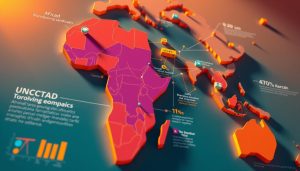Africa stands at the cusp of unprecedented economic transformation. With a combined GDP exceeding $2.6 trillion and six of the world’s ten fastest-growing economies, the continent presents compelling opportunities for forward-thinking businesses. As we look toward 2026, several markets are emerging as particularly promising expansion targets, driven by favorable demographics, infrastructure development, and progressive economic policies.
For businesses seeking first-mover advantage in these dynamic markets, understanding the unique characteristics, opportunities, and challenges of each region is essential. This guide examines the four most promising African markets for business expansion in 2026, providing actionable insights for executives and investors ready to capitalize on Africa’s growth trajectory.
The 4 top markets poised for significant growth across Africa by 2026
1. Kenya: East Africa’s Innovation Hub
Kenya has established itself as East Africa’s economic powerhouse, with projected GDP growth of 5.7% by 2026. The country’s strategic location provides access to a regional market of over 300 million consumers across the East African Community (EAC).
Economic Indicators
Kenya’s economy continues to diversify beyond its traditional agricultural base. The services sector now accounts for approximately 43% of GDP, with technology, finance, and tourism leading the charge. Foreign direct investment reached $1.1 billion in 2023, with further growth expected as the country strengthens its position as a regional business hub.
Key Growth Sectors: Financial technology (fintech), renewable energy, agribusiness, manufacturing, and information technology services.
Infrastructure Development
Kenya has made significant strides in infrastructure development, particularly in transportation and digital connectivity. The Standard Gauge Railway linking Mombasa to Nairobi has reduced logistics costs by 40%, while ongoing expansion to neighboring countries enhances regional trade opportunities.
Digital infrastructure is equally impressive, with mobile penetration exceeding 100% and internet penetration at 85.2%. The country’s robust digital ecosystem has facilitated the growth of mobile banking solutions like M-Pesa, which processes transactions equivalent to over 50% of Kenya’s GDP.
Investment Incentives
The Kenyan government offers attractive incentives for foreign investors, including:
- 10-year tax holidays for investments in special economic zones
- Investment deduction allowances of up to 150% for manufacturing investments
- Streamlined business registration through the e-Citizen portal
- Protection against expropriation through bilateral investment treaties
2. Nigeria: West Africa’s Economic Giant
As Africa’s most populous nation with over 200 million people, Nigeria represents an enormous consumer market with significant untapped potential. Despite economic challenges, Nigeria’s GDP is projected to reach $574 billion by 2026, cementing its position as Africa’s largest economy.
Economic Indicators
Nigeria’s economy is undergoing structural transformation, with increasing diversification beyond its traditional oil sector. Non-oil sectors including agriculture, manufacturing, and services now contribute over 70% to GDP. The digital economy is growing at 15.5% annually, outpacing most other sectors.
Key Growth Sectors: E-commerce, financial services, agriculture, entertainment (Nollywood), and consumer goods manufacturing.
Tech Ecosystem and Innovation
Lagos has emerged as one of Africa’s leading tech hubs, attracting over $1.2 billion in venture capital in 2022 alone. The city hosts over 700 startups and numerous innovation centers, creating a vibrant ecosystem for technology-driven businesses.
Nigeria’s fintech sector is particularly dynamic, with companies like Flutterwave and Paystack achieving unicorn status. The Central Bank’s regulatory sandbox for fintech innovation has further accelerated growth in digital financial services.
Trade Agreements and Regional Connectivity
Nigeria’s ratification of the African Continental Free Trade Area (AfCFTA) agreement opens access to a market of 1.3 billion people with a combined GDP of $3.4 trillion. The country’s membership in ECOWAS provides preferential access to West African markets, while bilateral trade agreements with major economies enhance global market access.
“Nigeria’s combination of market size, youthful population, and digital adoption makes it an essential consideration for any serious African expansion strategy.”
– African Development Bank Economic Outlook 2024
3. Morocco: Gateway Between Europe and Africa
Morocco’s strategic location at the crossroads of Europe and Africa positions it as an ideal entry point for businesses seeking to serve both continents. With GDP growth projected at 4.3% by 2026, Morocco offers a stable and increasingly diversified economy.
Emerging Industries and Consumer Demographics
Morocco has successfully developed several high-value industries, including automotive manufacturing, aerospace, and renewable energy. The country now produces over 700,000 vehicles annually, with exports primarily to European markets.
The renewable energy sector is particularly promising, with Morocco home to Noor Ouarzazate, one of the world’s largest concentrated solar power plants. The country aims to generate 52% of its electricity from renewable sources by 2030, creating significant investment opportunities.
Advantages
- Political stability and progressive economic policies
- Strategic location with access to European and African markets
- Advanced infrastructure including world-class ports and industrial zones
- Skilled workforce with competitive labor costs
- Free trade agreements with EU, US, and multiple African nations
Challenges
- Regional economic disparities between urban and rural areas
- Bureaucratic processes can delay business operations
- Limited natural resources compared to other African nations
- Dependence on agricultural sector vulnerable to climate conditions
- Language barriers for non-French speaking businesses
Regional Connectivity
Morocco’s Tanger Med Port is Africa’s largest port by capacity and connects to 186 ports worldwide. This infrastructure facilitates efficient trade with Europe (just 14km away across the Strait of Gibraltar) and serves as a gateway to West African markets.
The country’s extensive highway network, high-speed rail line, and 18 international airports further enhance connectivity. Morocco’s flag carrier, Royal Air Maroc, serves 94 destinations across four continents, facilitating business travel throughout the region.
4. South Africa: Sophisticated Market with Untapped Potential
South Africa remains Africa’s most industrialized economy, with sophisticated financial markets, robust legal frameworks, and world-class infrastructure. Despite recent economic challenges, the country offers significant opportunities for businesses seeking a mature market with advanced capabilities.
Political Stability and Regulatory Reforms
South Africa’s democratic institutions and independent judiciary provide a stable foundation for business operations. Recent regulatory reforms have streamlined business registration processes, reduced red tape, and enhanced protection for foreign investors.
The government’s Economic Reconstruction and Recovery Plan focuses on infrastructure development, energy security, and industrial growth. These initiatives aim to boost economic growth to 3% by 2026, creating new opportunities across multiple sectors.
Untapped Opportunities
Despite its mature economy, South Africa offers numerous untapped opportunities, particularly in:
Renewable Energy
South Africa’s Renewable Energy Independent Power Producer Procurement Programme (REIPPPP) has attracted over $20 billion in investment. The country aims to add 20GW of renewable capacity by 2030, creating opportunities in solar, wind, and energy storage.
Manufacturing
The automotive sector produces over 600,000 vehicles annually, with significant export capacity. Special Economic Zones offer incentives for manufacturing investments, including tax benefits and infrastructure support.
Business Process Outsourcing
South Africa has emerged as a leading BPO destination, with the sector growing at 22% annually. English language proficiency, cultural affinity with Western markets, and competitive costs drive this growth.
Mining Technology
With a 150-year mining history, South Africa leads in mining technology innovation. Opportunities exist in automation, safety systems, and sustainable mining solutions.
Agro-processing
Value-added agricultural processing presents significant opportunities, particularly in fruit, wine, and specialty foods for export markets.
Financial Technology
South Africa’s sophisticated financial sector provides a foundation for fintech innovation, with opportunities in payments, lending, and wealth management solutions.
Strategic Advantage: South Africa serves as an ideal base for companies looking to expand throughout Southern Africa, with well-established logistics networks and business services infrastructure.
Challenges & Solutions for African Market Entry
While the opportunities across these four markets are substantial, businesses must navigate several common challenges when expanding into Africa. Understanding these challenges and implementing effective mitigation strategies is essential for successful market entry.
How can businesses overcome logistics and infrastructure limitations?
Logistics remains a significant challenge across much of Africa, with infrastructure gaps increasing costs and delivery times. Successful businesses typically:
- Partner with established local logistics providers who understand regional nuances
- Utilize hub-and-spoke distribution models centered in major cities
- Invest in inventory management systems designed for unpredictable supply chains
- Consider local manufacturing or assembly to reduce import dependencies
What strategies help navigate regulatory complexity?
Regulatory environments vary significantly across African markets, with frequent changes and sometimes opaque processes. Effective approaches include:
- Engaging local legal counsel with specific industry expertise
- Establishing relationships with relevant regulatory authorities
- Considering special economic zones with streamlined regulations
- Participating in business associations that advocate for regulatory improvements
How should businesses address currency volatility and repatriation concerns?
Currency fluctuations and profit repatriation restrictions can impact investment returns. Mitigation strategies include:
- Implementing natural hedging by matching local revenues with local costs
- Utilizing forward contracts and other financial instruments to manage currency risk
- Structuring investments through countries with favorable bilateral investment treaties
- Reinvesting profits locally to reduce repatriation needs
What approaches work best for talent acquisition and development?
Finding and retaining qualified talent presents challenges in many African markets. Successful companies:
- Invest in robust training programs to develop local talent
- Partner with local universities and technical institutions
- Implement knowledge transfer programs between expatriate and local staff
- Offer competitive benefits packages tailored to local priorities
Market Comparison: Key Metrics for Decision-Making
| Metric | Kenya | Nigeria | Morocco | South Africa |
| Population (2026 est.) | 57.8 million | 218.5 million | 38.9 million | 62.3 million |
| GDP Growth (2026 proj.) | 5.7% | 3.8% | 4.3% | 3.0% |
| Ease of Doing Business Rank | 56 | 131 | 53 | 84 |
| FDI Inflow (2023) | $1.1 billion | $2.4 billion | $1.9 billion | $3.1 billion |
| Mobile Penetration | 112% | 93% | 137% | 176% |
| Internet Penetration | 85.2% | 73.0% | 84.1% | 68.2% |
| Corporate Tax Rate | 30% | 30% | 31% | 27% |
While these metrics provide a useful comparison, market selection should also consider industry-specific factors, competitive landscape, and alignment with your company’s strategic objectives.
Market Entry Strategies for 2026
Successful expansion into African markets requires thoughtful strategy selection based on market characteristics, regulatory environment, and business objectives. The following approaches have proven effective across the four markets highlighted in this analysis:
- Accelerates market entry through established networks
- Reduces regulatory hurdles through local knowledge
- Shares risk across partners
- Provides immediate access to distribution channels
- Most effective in Nigeria and Kenya where relationships are crucial
Joint Ventures & Partnerships
- Offers maximum control over operations and brand
- Allows customized facility design and location selection
- Qualifies for maximum investment incentives
- Builds long-term market presence and commitment
- Most suitable for Morocco and South Africa with stronger infrastructure
Greenfield Investment
- Provides immediate market presence and revenue
- Includes established customer base and supplier relationships
- Offers knowledge transfer from existing management
- Reduces time-to-market significantly
- Particularly effective in South Africa with mature M&A environment
Acquisition Strategy
Strategic planning is essential for successful African market entry
Phased Approach to Market Entry
Important Consideration: Each of the four markets highlighted has distinct business cultures and practices. Investing time to understand these nuances and adapt your approach accordingly is critical for success.
Conclusion: Positioning for Success in Africa’s Growth Markets
The four markets highlighted in this analysis—Kenya, Nigeria, Morocco, and South Africa—represent distinct opportunities for businesses looking to expand into Africa in 2026. Each offers unique advantages: Kenya’s innovation ecosystem, Nigeria’s massive consumer market, Morocco’s strategic location, and South Africa’s sophisticated business environment.
While challenges exist in infrastructure, regulations, and market dynamics, companies that take a strategic, well-researched approach to market entry can achieve significant returns. The key to success lies in thorough preparation, local partnerships, and a commitment to understanding the unique characteristics of each market.
As Africa continues its economic transformation, early movers in these key markets will establish competitive advantages that will be difficult for later entrants to overcome. For businesses with the vision and commitment to navigate these dynamic markets, the potential rewards are substantial.
Ready to Explore African Market Opportunities?
Our team of experts provides tailored market entry strategies, regulatory guidance, and partnership facilitation for businesses expanding into Africa.
For tailored advice on African expansion, contact our experts












